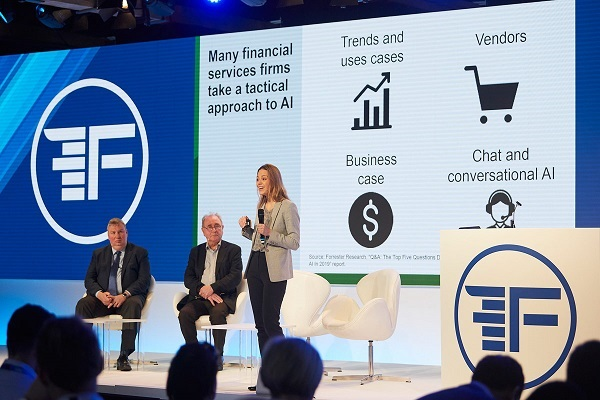Technology has played a crucial role in enhancing the life of a consumer. Various sectors are reaping benefits, but finance is still not quite there yet. When it comes to financial services, traditional banks are hesitant to adapt to newer technologies. This is mostly because of their legacy systems and compliance restrictions.
On the bright side, several FinTech startups are working with new-age technologies to create a more user-friendly platform.
From artificial intelligence, machine learning to the blockchain, various innovations will help streamline the financial sector. These five trends have shown the most promise in taking banking and finance to greater heights:
- Blockchain
- Robotics Process Automation
- RegTech
- Internet of Things
- Artificial Intelligence
Let’s take a look at some of these trends.
Blockchain Technology
Blockchain is a distributed database that exists on multiple computers. It’s constantly growing in the form of new sets of data, also known as blocks. Each of these new blocks contains a timestamp with a link to the previous block. These blocks together form a chain. The blocks are preserved forever, making data manipulation or faking documents impossible.
The blockchain-based technology is perfect for banks as it records transactions on a digital ledger. This ledger has limited access and will improve data security.
Blockchain technology is already helping banks with efficient transactions. By 2020, blockchain technology will power the production systems of 77% of the banks across the world
RegTech
For the FinTech industry, regulatory compliance is essential. Regulatory Technology or RegTech will help businesses cover both compliance and risk management. The increasing number of regulations will have a direct impact on the costs associated with compliance. RegTech however, will help FinTech firms manage costs and meet requirements.
RegTech will also provide opportunities in terms of competitive advantage, innovations, and technology integration.
With banks spending more than $270 billion on compliance and regulatory obligations, it seems like the integration of RegTech will drive FinTech. Some of the more popular solutions in the RegTech sphere are risk management, transaction reporting, regulatory intelligence, and customer identification.
Robotic process automation
RPA will help the financial sector automate human labor and minimize any scope for errors. Considering the amount of data one has to deal with, there is always scope for errors. Robotics process automation will streamline a variety of back-office processes. Most importantly, it will drastically reduce human involvement in tedious tasks.
RPA implementation will help banks reduce the processing cost by at least 30%. It will also free up the workforce to take up more critical tasks. Customer service, compliance, KYC, fraud detection, report automation are amongst the processes that can be automated.
The Robotics process automation industry is growing exponentially. According to the current RPA reports and trends, RPA is expected to be a $3 billion industry by 2021. By the end of 2019, 75% of financial institutions and banks will start using RPA software.
Internet of things
IoT is as an ecosystem of connected objects which are accessible through the internet. If an object has an IP address and the ability to collect data, it fits into this ecosystem.
This data from IoT will help financial companies gain a competitive edge over their peers. It will include user insights such as behavior preferences. Not only will this help bolster customer services but will help finance companies improve security on the whole.
Among the other benefits of IoT in Fintech are quick customer support, queue management, and contextual services.
By the end of 2020, more than 50 billion devices will be connected in an ecosystem. This will drive the IoT revenue to 3 trillion dollars.
Artificial intelligence
As we all know, artificial intelligence or AI is a subset of computer science. AI engines enable computers to perform tasks that are done by people. Implementing AI models in routine tasks saves cost, effort, and time.
Banks and FinTech companies have access to huge consumer data sets. Due to lack of IT setups, they’re unable to get the best out of it. Integrating an AI engine can help banks analyze every bit of data to provide unique insights for every user. With these insights, banks can create personalized campaigns and offers.
For instance, Crayon Data, a Singapore based big data, and AI startup have been helping tier-1 banks world over. Their personalization engine maya.ai analyzes large data sets and engages customers with relevant campaigns. The AI engine with taste led personalization is consistently delivering a significant increase in spends across customer segments for various banks.
AI in finance has led to other benefits and applications such as fraud detection, chatbots, crisis prevention, credit score generator, etc.
Keeping up with the latest FinTech trends is essential to stay relevant in the market. Big banks and FinTech companies are under a lot of pressure to innovate in this increasingly digital world. The only way to retain and attract new consumers is to adapt to modern technologies. With consumer expectations on the rise, implementing new features to their platforms can make the banking experience better. From automation to personalization, 2019 is turning out to be an exciting year for the global FinTech players























![Growth and future of Fintech: From Wire Transfer to Blockchain [Infographic]](https://crayondata.ai/wp-content/uploads/2019/02/banking1-1.jpg)